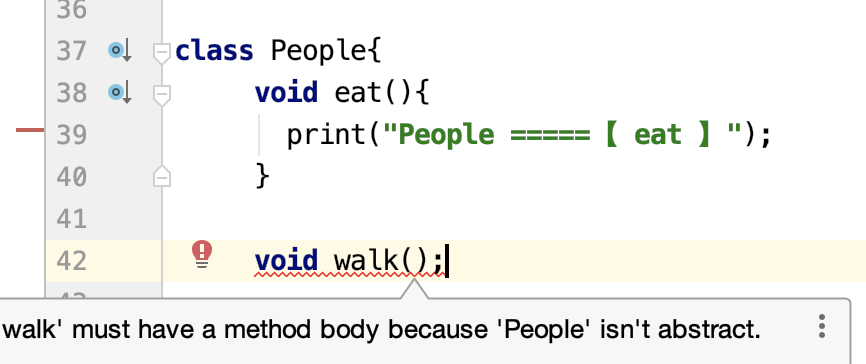1、类
- Getters 和 setters 方法
每个实例变量都有一个隐式的getter
class Rectangle {
num left, top, width, height;
Rectangle(num left,num top,num width,num height){
this.left = left;
this.top = top;
this.width = width;
this.height = height;
}
Rectangle(this.left, this.top, this.width, this.height);
num get right => left + width;//=> 单行函数简单写法,返回值可有可无
set right(num value) => left = value - width;
}
- 实现类中的方法,必须有body

-
抽象类中
abstract class People{ void eat(){ print("People =====【 eat 】"); } void walk(); }
2、抽象类
除了不能实例化对象之外,类的其它功能依然存在,成员变量、成员方法和构造方法的访问方式和普通类一样。
Java中抽象类表示的是一种继承关系,一个类只能继承一个抽象类,而一个类却可以实现多个接口。
-
如果一个类包含抽象方法,那么该类必须是抽象类。
-
抽象类中不一定包含抽象方法,但是有抽象方法的类必定是抽象类。
-
抽象类中有成员变量、成员方法和构造方法 还可以有抽象方法
abstract class People { String name; People(String name) { } void eat() { System.out.println("People =====【 eat 】"); } abstract void walk(); }Dart 中抽象方法可以省略 abstract
abstract class People {
String name;
People({String name}) {
}
void eat() {
print("People =====【 eat 】");
}
void walk();
}
- 任何子类必须重写父类的抽象方法,或者声明自身为抽象类
class Student extends People{
@override
void walk() {
eat();
}
}
Java
class Student extends People {
Student(String name) {
super(name);
// TODO Auto-generated constructor stub
}
@Override
void walk() {
// TODO Auto-generated method stub
}
}
dart 没有interface 关键字 但是有implements 每一个class (包括abstract class) 都隐含一个接口 都可以使用implement
abstract class Animal{
void run();
}
class People {
String name;
People({String name})
void walk(){}
}
class Student implements People{
@override
String name;
@override
void walk() {
// TODO: implement walk
}
}
-
任何子类必须重写父类的抽象方法,或者声明自身为抽象类。
-
- 抽象类不能被实例化(初学者很容易犯的错),如果被实例化,就会报错,编译无法通过。只有抽象类的非抽象子类可以创建对象。
-
-
-
抽象类中的抽象方法只是声明,不包含方法体,就是不给出方法的具体实现也就是方法的具体功能。、
String name; People({String name}) { } void eat() { print("People =====【 eat 】"); } void walk(); } class Student extends People{ @override void walk() { eat(); } }
-
-
构造方法,类方法(用 static 修饰的方法)不能声明为抽象方法。
其他部分见技术分享ppt
3、mixin
mixin是在多个类层次结构中重用代码的一种方式。
mixin Animal{
void run(){}
}
mixin People {
void walk(){}
}
class Student with Animal,People {
void eat() {
run();
walk();
}
}
4、泛型
- 泛型类
【abstract】 class Cache<T> {
T getByKey(String key);
void setByKey(String key, T value);
}
-
泛型方法
泛型参数(
)允许你在很多地方使用类型参数T -
在函数的返回中返回类型(T)
-
在参数的类型中使用(List
) -
在局部变量的类型中(T tmp)
-
限制参数化类型
-
T first<T>(List<T> ts) {
// Do some initial work or error checking, then...
T tmp = ts[0];
// Do some additional checking or processing...
return tmp;
}
class Foo<T extends SomeBaseClass> {
// Implementation goes here...
String toString() => "Instance of 'Foo<$T>'";
}
class Extender extends SomeBaseClass {...}
可以使用SomeBaseClass 或它的任何子类作为泛型参数:
var someBaseClassFoo = Foo<SomeBaseClass>();
var extenderFoo = F
class GeneralTest<T>{
T _vari;
T get myVari{
return _vari;
}
GeneralTest.newVV(){
}
GeneralTest(T t){
this._vari = t;
}
void setV(T v){
_vari = v;
}
static T newV<T>(T t){
return t;
}
}
class Test{
void main(){
GeneralTest<BT>.newVV();//命名构造函数
// GeneralTest.newV(BT(i: 2)).name; 静态方法
}
}
对provider 的封装
import 'package:provide/provide.dart';
import 'package:xxwq_flutter/libs/states/config_state_model.dart';
class ProvierHelper{
static var providers = Providers();
static var themeConfigModel = ThemeConfigModel();
static init({model,child,dispose = true}){
providers = Providers()
..provide(Provider<ThemeConfigModel>.value(themeConfigModel));
return ProviderNode(child: child, providers: providers,dispose: dispose);
}
static connect<T>({builder, child, scope}) {
return Provide<T>(builder: builder, child: child, scope: scope);
}
static T value<T>(context,{scope}){
return Provide.value<T>(context,scope: scope);
}
}